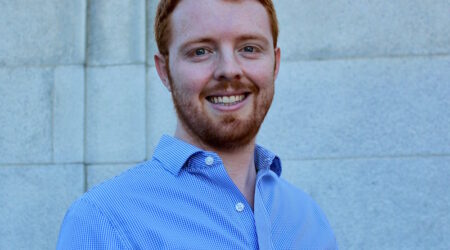What are the institutional barriers contributing to homelessness in California, and what can be done to alleviate them? What are the consequences of the criminalization of the homeless, and what are these residents’ rights and civil liberties? These questions were at the heart of a “Matrix on Point” panel discussion recorded on September 21, 2020, which brought together researchers, advocates, and medical practitioners panel to explore the Bay Area’s housing crisis and homelessness.
Panelists for the 90-minute presentation included Chris Herring, a Postdoctoral Fellow at the Inequality in America Initiative at Harvard University; Margot Kushel, MD, Professor of Medicine in the Division of General Internal Medicine at Zuckerberg San Francisco General Hospital and Trauma Center and the Director of the UCSF Center for Vulnerable Populations; and Tomiquia Moss, Founder and CEO of All Home, a new organization dedicated to finding regional solutions to the homelessness and housing crisis in the Bay Area.
“The three people here have probably done more than anybody to help us understand the causes of homelessness in the Bay Area,” said the panel’s moderator, Carolina Reid, Associate Professor in the UC Berkeley Department of City and Regional Planning and the Faculty Research Advisor for the Terner Center for Housing Innovation.
During the panel, each speaker gave a roughly ten-minute presentation; these were followed by a Q&A, with questions asked by Reid and submitted by members of the audience. The speakers reinforced that homelessness is not an unsolvable problem, but that its root causes are often ignored. In her comments, for example, Kushel noted that the primary driver of homelessness is a shortage of housing for “extremely low-income” (ELI) residents. “Homelessness is not caused by mental health and substance use problems,” Kushel emphasized. “The more we blame this problem on highly stigmatized medical conditions, the more it lets us off the hook for solving the fundamental problems that have brought us to this point. We have an extraordinary shortage of…housing that is available and affordable to people who make less than 30% of the area median income.”
Kushel also stressed the major contributing impact of structural racism, noting that a disproportionately large percentage of homeless people in the Bay Area are people of color. “There’s no way we can have an honest conversation about homelessness without talking about the ongoing effects of structural racism,” Kushel said. “We are still very much living with the downstream effects of redlining and other forms of discrimination.”
In her comments, Tomiquia Moss agreed that structural racism is a root cause that must be addressed, but she also noted that an improved regional approach is necessary to help cities find a common solution. “The Bay Area counties are doing incredible work on the ground, trying to support people experiencing homelessness every day, but they’re doing it all in in silos,” Moss said. “Our cities are scrambling, trying to figure out what to do…. We have this very fractious system by which we are trying to solve one of the most fundamental social problems of our time…. When we think about regional approaches to homelessness, the first thing we have to think about is the region actually has to operate as one place.”
Moss said that much of the work of her organization, All Home, is to “try to figure out, how do we bring stakeholders together to look at best practice and borrow lessons-learned and to strategize around resource-sharing, and to assess what assets need to be brought to the table in order for us to do a much better job across geographies in order to address the homelessness and housing crisis…. People talk regionally, but they act very locally. Land-use decisions and zoning changes are held at the local level, and we don’t really have a lot of regional, state, or federal governance that forces us to work as a region.”
Addressing income inequality should be another priority, Moss said. “People are simply unable to afford the rents that we demand in the Bay Area,” Moss said. “And then we blame them for being poor…. We haven’t actually solved the fundamental math problems of wealth inequality.”
In his remarks, Chris Herring presented research he had conducted while earning his PhD in Sociology at UC Berkeley; his enthnography-based dissertation focused on the impacts of anti-homeless laws, such as laws banning panhandling, camping, or lying on sidewalks. “These are laws that prohibit life-sustaining activities that homeless people have no choice but to undertake in public,” Herring said. “These laws have been spreading nationwide and have been growing at the fastest rate in their history over the last 10 years.”
Herring said that the increased criminalization of homelessness was driven in part by “urban development in areas where used to folks used to be able to camp without receiving complaints.” Gentrification, he said, has led to a “different type demographic of folk moving to the city, who are more likely to call the police.” Accompanying this has been the proliferation of “business Improvement districts” through which groups of property owners, merchants, and esidents hire private security firms who call the police when homeless residents refuse to move.
The criminalization of homelessness is a major issue, Herring said, because it perpetuates the cycle of poverty. “One of the things that folks feared most was the destruction of their property,” Herring said. “In fact, they feared the destruction of their property more than arrest. And what I saw happening was that arrests were actually used as a means to dispossess people of their property.” Herring said he is continuing to work on reforms, such as reforming the dispatch so that police officers are not first responders to homeless-related ordinances.
Ultimately the panelists agreed that, while homelessness is a complex issue, there are solutions available that must be adopted from all levels of government. “We are at a precipice in our time where we don’t have the luxury of not figuring out what the foundational challenges are to actually ending homelessness in the Bay Area,” Moss said. “Homelessness is solvable. It’s not just about finding someone housing. It is about figuring out how we bring our most vulnerable residents inside and helping them not just subsist in our communities, but to thrive.”
Watch the video above or on YouTube.


